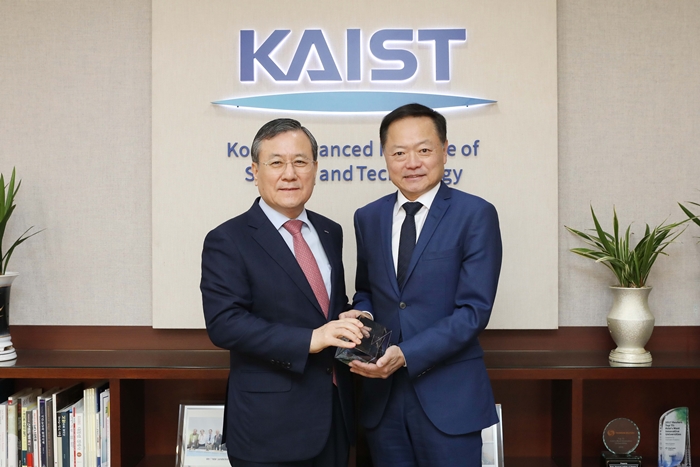event

< Director Steve Ahn (Right) >
Steve Ahn, the Director of Startup KAIST, donated one hundred million KRW of development fund to his alma mater KAIST to increase entrepreneurship opportunities and nourish start-up culture on campus. Professor Ahn founded Leadis Technology Inc. in 2000, a fabless semiconductor company based in Silicon Valley that develops mobile phone sub-display applications. Leadis Technology Inc. made its stock market debut on the NASDAQ in 2004.
“KAIST produces many start-ups, however, entrepreneurial culture has yet to become a growth engine of KAIST, compared to education and research. Through invigorating entrepreneurial spirit and revitalizing start-up activities, KAIST should reclaim its leadership role in creating decent jobs and fuelling economic growth and competitiveness at home and abroad,” he said during the donation ceremony last month.
He added, “I am forever grateful to my alma mater KAIST for having provided me with a quality education. It was a valuable asset that helped me gain an opportunity to nurture the up-and-coming, next-generation scholars as a professor at KAIST. I decided to make this donation hoping that KAIST students will be given more entrepreneurship opportunities, and a healthy start-up ecosystem will be accelerated beyond KAIST.”
Director Ahn earned his bachelor’s degree in metallurgy from Seoul National University, followed by a master’s degree in materials engineering from KAIST. He received another master's degree in electrical engineering, and was granted a doctorate in materials engineering from Stanford University.
He has been mentoring start-up activities at Startup KAIST since 2014, and serving as the principal professor at K-School since 2016. From these activities, he was recognized for his academic achievements and committed leadership, which led him to be appointed as the Director of Startup KAIST in March 2019.
(END)
-
research Simultaneous Analysis of 21 Chemical Reactions... AI to Transform New Drug Development
< Photo 1. (From left) Professor Hyunwoo Kim and students Donghun Kim and Gyeongseon Choi in the Integrated M.S./Ph.D. program of the Department of Chemistry > Thalidomide, a drug once used to alleviate morning sickness in pregnant women, exhibits distinct properties due to its optical isomers* in the body: one isomer has a sedative effect, while the other causes severe side effects like birth defects. As this example illustrates, precise organic synthesis techniques, which selectivel
2025-06-16 -
event KAIST Holds a Ceremony to Declare their Renewed Commitment for Ethical Management
KAIST held a ceremony to declare their renewed "Commitment for Ethical Management" to raise awareness and solidify the commitment its members to faithfully fulfill ethical responsibilities and duties. Last March, the university established the 'Special Committee for Ethical Management,' chaired by the Provost, and under the leadership of this committee, a new 'Code of Ethics' and 'Code of Conduct' were prepared, containing ethical standards that members must adhere to across all areas of educ
2025-06-16 -
research “One Experiment Is All It Takes”: KAIST Team Revolutionizes Drug Interaction Testing, Replacing 60,000 Studies
A groundbreaking new method developed by researchers at KAIST and Chungnam National University could drastically streamline drug interaction testing — replacing dozens of traditional experiments with just one. The research, led by Professor Jae Kyoung Kim of KAIST Department of Mathematical Sciences & IBS Biomedical Mathematics Group and Professor Sang Kyum Kim of Chungnam National University's College of Pharmacy, introduces a novel analysis technique called 50-BOA, published in Natu
2025-06-16 -
research High-Resolution Spectrometer that Fits into Smartphones Developed by KAIST Researchers
- Professor Mooseok Jang's research team at the Department of Bio and Brain Engineering develops an ultra-compact, high-resolution spectrometer using 'double-layer disordered metasurfaces' that generate unique random patterns depending on light's color. - Unlike conventional dispersion-based spectrometers that were difficult to apply to portable devices, this new concept spectrometer technology achieves 1nm-level high resolution in a device smaller than 1cm, comparable in size to a fingernail
2025-06-13 -
research KAIST Predicts Diseases by Early Detection of Aging Signals in Liver Tissue
- KAIST-KRIBB Develops ‘FiNi-seq’ Technology to Capture Characteristics of Fibrotic Microenvironments Accumulated in Liver Tissue and Dynamic Changes of Early Aging Cells - Elucidation of the Spatial Ecosystem of Aged Liver Tissue, where Reprogramming of Senescent Cells and Immune Exhaustion Progresses, at the Single-Cell Genome and Epigenome Levels < (From left) Professor Jong-Eun Park of KAIST Graduate School of Medical Science and Engineering (GSMSE), Dr. Chuna Kim of K
2025-06-12